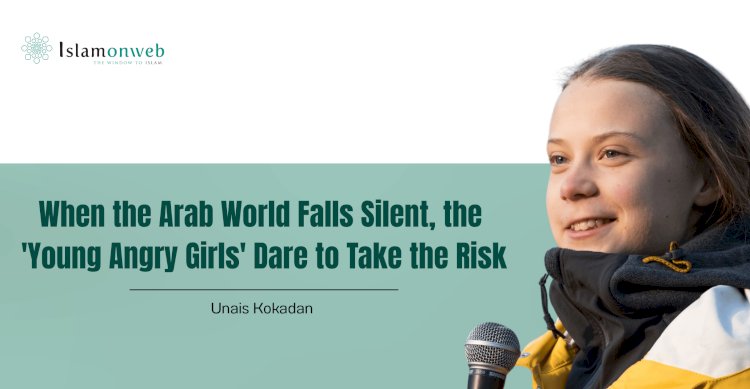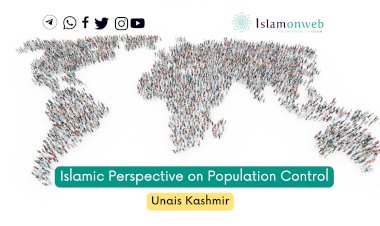When the Arab World Falls Silent, the 'Young Angry Girls' Dare to Take the Risk
During her days aboard the Madleen yacht, in an interview with journalist Amy Goodman, Greta Thunberg was asked, “Why are you taking this extremely dangerous journey?” She replied, “I happen to have a platform for some reason, then it is my moral obligation to use that platform.” Her statement underscores the ethical responsibility of celebrities and influencers to speak out on global social issues. While many retreat to ‘safe zones,’ avoiding comment on the widespread discrimination and ethnic cleansing taking place across the world, Thunberg’s stance stands as a bold exception.
Taking a stand for Palestine—particularly speaking up for Gaza’s civilians and against the genocide—involves significant personal risk. Anyone who raises their voice in solidarity is often swiftly labeled “anti-Semitic.” Greta Thunberg’s case is a clear example. As soon as she began speaking out for Gaza, much of the world seemed to forget her years of contributions to climate activism. Rather than acknowledging her moral clarity, critics rushed to brand her “anti-Semitic,” highlighting the hostile climate faced by those who challenge dominant narratives on Palestine.
Thunberg’s message is not just directed at celebrities and influencers—it is also a wake-up call to Arab leaders. Despite being neighbors to Palestine and sharing deep cultural and historical ties, many Arab governments have remained passive in the face of the ongoing genocide in Gaza. Their silence and inaction in the face of mass suffering, especially the starvation of Gaza’s civilian population, raises serious moral questions.
The Message of Madleen
The Madleen yacht, part of the Freedom Flotilla Coalition, was a symbolic slap in the face to the Arab Muslim countries and Palestine’s neighboring states that have remained silent. Departing from Sicily, the yacht carried a crew of 12 international activists—including Swedish climate activist Greta Thunberg—and humanitarian aid for the besieged people of Gaza. The risk taken by this small crew was immense, as they knowingly placed their lives in danger to draw the world’s attention to the ongoing blockade of Gaza.
Their courage is even more striking in light of the coalition's past experiences. Ships previously launched by the Freedom Flotilla have either been intercepted by Israel or met with deadly force. In 2010, the Mavi Marmara was stormed by Israeli forces, resulting in the deaths of 10 activists. More recently, in May 2025, another ship named Conscience was attacked by Israeli drones near Malta and failed to reach Gaza. With these precedents in mind, the mission of the Madleen was clearly a life-or-death decision. Despite the danger, the crew chose to act—determined to break the siege and once again awaken global consciousness to the suffering of Gaza’s starving population.
Here, we take a brief look at the courageous women activists aboard the Madleen yacht—their bold stances and the criticism they faced in return.
Greta Thunberg: ‘The Angry Girl’
The presence of an international figure like Greta Thunberg greatly amplified the impact of the mission, helping it reach millions across the globe and drawing the attention of various governments to the crisis in Gaza. Her involvement emphasized that the Palestinian cause is not merely a religious or regional issue, but a humanitarian one that concerns all of humanity. Speaking about her decision to join the mission, Greta stated: “And if my presence on this boat can make a difference, if that can show in any way that the world has not forgotten about Palestine, and to try once again to break the siege and open up a humanitarian corridor and deliver the extremely needed humanitarian aid—then that's the risk I'm willing to take.”
Her words highlight the seriousness of the risks she took in support of Gaza’s starving population. According to the United Nations, at least 500 trucks of aid are required daily to meet the basic needs of those living under siege—a need that continues to go unmet.
As Greta set sail, she was met with a wave of hate comments and mockery—criticism she could have easily avoided had she chosen to remain silent, like many other celebrities. One of the harshest comments came from U.S. Senator Lindsey Graham, Posting on X, he wrote: “Hope Greta and her friends can swim!”—a statement widely interpreted as a threat. Greta calmly responded, “We can swim very well.”
Even U.S. President Donald Trump took aim at her, telling the media: “She’s a young, angry person. She’s certainly different. I think she has to go to an anger management class. That’s my primary recommendation for her.” After being deported by Israel and returning to Sweden, Greta responded with composure and strength: “I think the world needs a lot more young angry women, to be honest—especially with everything going on right now.”
Rima Hassan:
Rima Hassan, a French-Palestinian lawyer and Member of the European Parliament (MEP), was another prominent figure aboard the Madleen. Born in 1992 in the Neirab refugee camp in Syria to Palestinian parents, Hassan moved to France at the age of 10. She lived as a stateless refugee before eventually gaining French citizenship.
Unlike Greta Thunberg and three other activists who accepted deportation, Hassan refused to sign documents that would classify her entry into Israel as illegal. She firmly argued that she had been forcibly taken from international waters. As a result, she was brought before Israel’s Detention Review Tribunal at the Ramleh detention center.
According to Al Jazeera journalist Omar Faiad—who spoke to the media after his release—Hassan was threatened with having her head “smashed against the wall” by Israeli soldiers for refusing to sign the deportation papers.
Following interrogation, all 12 activists were transferred to Givon Prison in Ramla, central Israel. Hassan and Brazilian activist Thiago Ávila were later placed in solitary confinement at separate facilities. Hassan was sent to Neve Tirza, Israel’s only women’s prison, reportedly after writing “Free Palestine” on a wall at Givon Prison. The cell was described as unsanitary, with no window, cockroaches, cigarette butts, and wastewater under the bed.
Upon her release and return to Paris by June 12, Hassan addressed a large crowd—still wearing her prison uniform. Standing defiantly before them, she declared: “I have one word for Israel: the next boat is getting ready to sail. It will be called Handala, and there will be all the boats we need to break the siege.”
Yasemin Acar:
Yasemin Acar, a 37-year-old German activist of Kurdish descent, was another prominent woman activist aboard the Madleen. Born and raised in Germany to Kurdish parents from Turkey, Acar has been involved in activism since the age of 15, focusing on refugee rights, human rights, and combating anti-Muslim racism.
During the Madleen mission, Acar played an active role by livestreaming events from the yacht and calling for global solidarity with Palestine. She has faced repeated persecution for her activism, including being held at gunpoint in her own home by German authorities for publicly supporting the Palestinian cause. Acar is a vocal critic of the German government, especially for its military aid to Israel. In one of her recent public statements, she condemned German policies, declaring:
“Germany chooses to starve children. Germany chooses to bomb children. We voted them into power, and when they are starving children, this is why we have to rise up and say: no more.”
Acar was among eight activists who refused to sign deportation documents admitting to “illegal entry,” arguing—as others did—that they were forcibly taken from international waters. They were held at Givon Prison in Ramla, where conditions were reportedly harsh, with limited access to food, water, and rest.
After her release and deportation, Acar spoke out about the appalling conditions in Israeli prisons and remembered the Palestinian children who have been imprisoned for years. She said:
“Our lives do not have more worth than the lives of people in Gaza. That was our message to the world—we stand in solidarity. The aid we brought was just a drop in the ocean, but that drop carries a big, big message: to our governments, to their complicity, and to those who remained silent for 20 months. The international community needs to stop its complicity. They need to stop sending weapons—they need to send aid instead of weapons.”
What Happened After Seizure?
The Madleen yacht was seized by Israeli forces in international waters, approximately 100 nautical miles off the coast of Gaza—a region where Israel has no legal jurisdiction. Because the seizure occurred outside Israeli-controlled territory, activists described the incident as an act of “kidnapping.”
Following the seizure, the yacht was forcibly towed to Ashdod Port. Upon arrival, Israeli forces reportedly sprayed the vessel with an unknown substance and ordered the activists to discard their phones. The crew was then taken to a military base in Ashdod for interrogation. According to accounts, Israeli Defense Minister Israel Katz instructed the Israeli Defense Forces (IDF) to show detainees footage of Hamas’s October 7, 2023 attack, portraying the flotilla as a pro-Hamas operation.
Later, sandwiches were distributed to the activists—reportedly only so the moment could be filmed and used for public relations purposes. This manipulation was publicly revealed by Al Jazeera journalist Omar Faiad, who was among those detained.
Four activists—including Greta Thunberg and Al Jazeera journalist Omar Faiad—agreed to deportation and were flown out of Israel by June 11, 2025. Thunberg traveled via France before returning to Sweden. The remaining eight activists, including French MEP Rima Hassan, refused to sign documents admitting to illegal entry into Israel, arguing that they had been forcibly brought from international waters. These individuals were brought before Israel’s Detention Review Tribunal in Ramleh, which reviewed custody orders pending deportation. As of June 13, 2025, all 12 activists had either been deported or were in the process of being deported (Some of the deportations have been delayed due to the recent Israel-Iran conflict, as many Israeli airports are currently closed)—while there were no official reports on the release of the Madleen yacht or the humanitarian aid it carried.
Conclusion:
There have been many remarkable young figures who stood up for the Palestinian cause—such as American activist Rachel Corrie, who was killed on March 16, 2003, at the age of 23 in Rafah, Gaza Strip, when she was crushed by an IDF bulldozer while trying to prevent the demolition of a Palestinian home during the Second Intifada. Palestinian women activists like Leila Khaled, Muna El-Kurd, and Ahed Tamimi have also significantly amplified the Palestinian cause on the global stage, inspiring young women across the world. The growing resistance led by well-educated youth across universities worldwide reflects the rising support for the Palestinian cause among the younger generation.
About the author:
Unais Kokadan is a postgraduate research scholar in the Department of Study of Religion at Darul Huda Islamic University, specializing in Islamic history, Ottoman studies, and civilizational thought.
Disclaimer
The views expressed in this article are the author’s own and do not necessarily mirror Islamonweb’s editorial stance.
























Leave A Comment